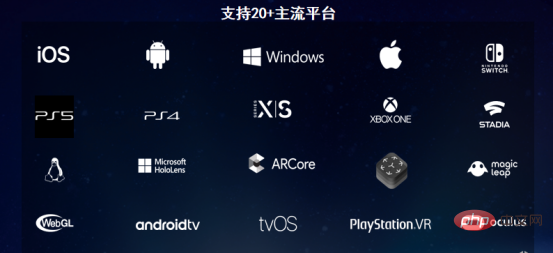 Technology peripherals
Technology peripherals AI
AI Meta launches a 4-year hardware roadmap and is committed to creating the 'Holy Grail' AR glasses, burning $13.7 billion
Meta launches a 4-year hardware roadmap and is committed to creating the 'Holy Grail' AR glasses, burning $13.7 billionNow, who is talking about the metaverse?
In 2022, Meta Labs Reality Labs has lost $13.7 billion in AR/VR R&D investment.
More than last year (nearly $10.2 billion), which is simply jaw-dropping.

Also see, the explosion of generative AI, a wave of ChatGPT craze, let Meta The interior center of gravity is also tilted.
Just some time ago, during the company’s quarterly financial report conference call, “Metaverse” was mentioned only 7 times. And "AI" has 23 .
# Doing business that is almost losing money, is the Yuan Universe so indifferent?
No No No!
Meta recently announced its VR/AR hardware technology roadmap for the next four years.
In 2025, the first smart glasses with a display screen and a "neural interface" smart watch that controls the glasses will be released.
In 2027, the first AR glasses with mature technology will be launched. Zuckerberg calls it the "holy grail" that will redefine humanity's relationship with technology by the end of this decade.
It can only be said that on the road to the metaverse, Meta becomes more and more courageous with every setback (manual thumbs up).
The codenames of three new headsets have been revealed
In a roadmap presentation on Tuesday, Alex Himel, vice president of AR, laid out the plans for 2027 There are plans to release a series of devices this year.
According to internal employees, Meta will launch its flagship product later this year Quest 3 (codenamed Stinson) .
Compared with the previous generation Quest 2 ($400), it is thinner and lighter, and even has at least 2 times the functionality.
#Of course, the price goes without saying, it is definitely more expensive than the previous generation.
#Like the Quest Pro, a machine worth 10,000 yuan released last year, Quest 3 more prominently demonstrates the function of mixed reality experience.
#This experience does not completely immerse the wearer, mainly thanks to the Quest Pro front-facing camera that can see through the screen to see the real world.
Mark Rabkin, vice president of Meta’s VR department, said,
“Mixed reality will Is a huge selling point, the new headset will have a "smart guardian" to help users navigate the real world while wearing the device.
#The team’s main goal is to make users feel more comfortable and natural because of mixed reality from the moment they put on the new device.
# "You can stay in the headset longer, walk across the room effortlessly, put cats and objects on the table, and even Hold the coffee.」

Quest 3 will support 41 new applications and games, which can maximize the performance of the newly upgraded hardware and allow people to experience more profound mixed reality scenes.
In 2024, Meta will also launch a cheaper and more convenient head display code-named "Ventura" .
#The purpose of making this headset is very simple, which is to create a strong product of Meta at the same price in the virtual reality consumer market.
#As for whether the second generation of Quest Pro will be launched soon is still unknown.
The most likely "successor" at present will come out after the head display code-named Ventura, code-named La Jolla.
#This is a state-of-the-art headset equipped with the Codec Avatars system that can bring photorealistic VR avatars.

Rabkin’s expectation for La Jolla is that “it has a higher resolution for work and the ability to Really get the job done with work, text, and other similar tasks. At the same time, we also hope to get a more comfortable experience from Quest Pro."
At the same time, Rabkin acknowledged that Quest currently needs to work hard to keep new users engaged.
This is the third year since the release of Quest 2, and its new buyers do not like it as much as early buyers and wear it as often as they did.
8 years of research and development, AR glasses "holy grail"
In addition to the Quest series of headsets, thousands of Meta employees are building a Future AR glasses, and wrist devices to control them.
The main difference from VR headsets is that Meta plans to launch AR glasses that can be worn all day long to replace smartphones.
#Xiao Zha’s ambition is to make the next generation iPhone.
Himel said that by 2025, the third generation of smart glasses will be equipped with a "viewfinder" display for viewing incoming text messages, scanning QR codes and real-time translation of text in another language.
In addition, the glasses will be equipped with a "neural interface" strap that allows the wearer to control the glasses through hand movements.
#For example, sliding your finger upward in the air will instantly make you feel like "Iron Man".

The wristband also allows the wearer to use a virtual keyboard and can interact with Cell phone speed to type the same words per minute.
# Also integrates with Meta’s social media apps and provides health and fitness features.
Himel confirmed that while Meta plans to launch a smartwatch with a detachable display and camera, it is currently working on another smartwatch. Eyewear to match the year 2025.
“We don’t want people to have to choose between a wrist input device and their preferred smartwatch features, so we’re building a neural interface watch .》

Himel showed employees a demonstration of the glasses, in which the camera on the glasses shows the wearer's front-on view during a video call, while Show selfie view from camera on watch.
Meta’s first true pair of AR glasses has been developed within the company for 8 years, codenamed Orion.
# Not only is the technology used advanced, but it is also very expensive, aiming to project high-quality Avatar holograms into the real world.
According to Himel, the company will conduct an internal release in 2024 to allow employees to test the glasses. The first version will not appear until 2027.
At that time, Meta will launch innovative AR glasses and the “Scale” series of second-generation neural smart watches.
Himel said that the nearly 2 billion pairs of ordinary glasses and hundreds of millions of smart watches sold every year are a huge opportunity for Meta.
When you put on AR glasses, ads will appear in the air, which will be a huge business.
This way, the company can make money relying on its existing advertising business model. Higher revenue can be achieved by selling virtual goods, optional add-ons such as cloud backup, and AR advertising.
#To date, Meta has sold nearly 20 million Quest headsets.
Yuanverse, do you still want to go on?
The Metaverse has already pointed towards the next generation form of the Internet, and competition among major technology companies to become the giants in the Metaverse era is fierce.
Among them, Facebook can be said to be the most radical, directly changing the company name to Meta and turning to a new computing platform based on virtual reality.
In the field of VR hardware, Oculus is the leader. Meta acquired it in 2014 to make up for the shortcomings of the hardware and hold the key to the door to the metaverse. in hand.
The VR headset Quest 2 has helped Meta gain a dominant position in VR hardware.
Since then, Meta has released its latest VR headset, Quest Pro, and announced that it will launch its first AR glasses, Orion, in 2024 and continue to develop hardware.
Starting from the launch of Horizon Worlds, Meta has officially taken the first step to make the metaverse a reality. In this virtual world platform, relying on Meta’s long-term efforts With the Codec Avatars project, users can create a realistic 3D avatar (albeit without legs) and start gaming in a custom world.

Meta continues to take advantage of its former advantages as a social platform and strives to enhance the user experience in the Metaverse world sense of experience.
For example, in delineating private boundaries in the metaverse, users bring their own one-meter string; introducing 3D avatars on platforms such as Instagram, and Xiao Zha himself is also satisfied with the change superior.

Meta’s confidence in the Metaverse is inseparable from its long-term hard work.
The artificial skin, pneumatic gloves and mechanical bionic eyes that have been secretly developed for many years have jointly opened up the three major human beings of vision, hearing and touch on Meta's journey into the metaverse. Sensory experience.
Joined with NVIDIA to launch AI supercomputer RSC, Builder Bot that generates metaverse scenes through speech, "World Model" that allows AI to catch up with human intelligence, and super AI assistant CAIRaoke, the new view synthesis framework HVS-Net and other technologies will also make Meta even more powerful on the journey to the metaverse.

## Meta can be said to have entered the metaverse field with determination to burn all boats. Faced with a large number of layoffs, Despite the huge losses, he said "we still believe in the future" and will continue to invest 20% of the funds in Reality Labs, the VR department, and insist on the Metaverse plan unswervingly.
#Since Meta officially announced the Yuanverse, tens of billions of dollars have been invested.

You must know that the development of Metaverse hardware still requires continuous accumulation of technology in order to achieve breakthroughs .
#The four-year hardware roadmap formulated by Meta is also paving the way for itself.
When it comes to the next boom in the dimensional universe, Meta will definitely become the leader in the VR/AR industry.
The above is the detailed content of Meta launches a 4-year hardware roadmap and is committed to creating the 'Holy Grail' AR glasses, burning $13.7 billion. For more information, please follow other related articles on the PHP Chinese website!
 什么是OCO订单?Apr 25, 2023 am 11:26 AM
什么是OCO订单?Apr 25, 2023 am 11:26 AM二选一订单(OneCancelstheOther,简称OCO)可让您同时下达两个订单。它结合了限价单和限价止损单,但只能执行其中一个。换句话说,只要其中的限价单被部分或全部成交、止盈止损单被触发,另一个订单将自动取消。请注意,取消其中一个订单也会同时取消另一个订单。在币安交易平台进行交易时,您可以将二选一订单作为交易自动化的基本形式。这个功能可让您选择同时下达两个限价单,从而有助于止盈和最大程度减少潜在损失。如何使用二选一订单?登录您的币安帐户之后,请前往基本交易界面,找到下图所示的交易区域。点
 聊一聊AI有哪四种类型Apr 09, 2023 pm 11:31 PM
聊一聊AI有哪四种类型Apr 09, 2023 pm 11:31 PM随着人工智能成为一种趋势,人们对它如何工作以及可以做什么存在很多问题。一个经常被问到的问题就是——AI有哪四种类型。下面小编就来为大家解答一下。AI有哪四种类型反应性机器反应性机器在AI中是一个非常受欢迎的概念。这是因为它是最基本也是最古老的AI类型。反应性机器是指仅对某些刺激和场景有反应性的机器。与之后的许多人工智能软件不同的是,它们不能利用以前的经验或负载的知识来评估和应对特定的情况。甚至不使用GPS或数字地图来导航周围的环境或绘制路线。相反,它们会根据所看到的东西移动。反应型机器擅长象棋和
 对话清华黄民烈:借用自动驾驶分级定义AI对话系统,元宇宙虚拟伴侣或位于L5Apr 12, 2023 pm 11:34 PM
对话清华黄民烈:借用自动驾驶分级定义AI对话系统,元宇宙虚拟伴侣或位于L5Apr 12, 2023 pm 11:34 PM本文转自雷锋网,如需转载请至雷锋网官网申请授权。“我很庆幸能陪在你身边,通过你的目光看世界(I'm so happy I get to be next to you and look at the world through your eyes.)。"这是影片《Her》中的一句台词,由AI语音助手Samantha对男主角说出。这句话对于迷失在钢铁森林中,感到失落而无力的男主角来说是莫大的安慰。Samantha是一款几乎万能的自我学习型操作系统。她能帮助男主角筛选出最优秀的信件,发给他喜
 人工智能新兴岗位走热,虚拟人、数字员工前景看好Apr 09, 2023 pm 12:11 PM
人工智能新兴岗位走热,虚拟人、数字员工前景看好Apr 09, 2023 pm 12:11 PM随着人工智能迅猛发展及人口红利消失,大批新兴岗位如雨后春笋般涌现,机器人、虚拟人、数字员工在各种场景中频繁亮相上岗,引发了广泛关注。机器人大家都比较熟悉,接受度普遍较高。那么,虚拟人和数字员工又是什么样的职业?就业前景如何呢?下面跟随小编一探究竟吧!数字时代的职场,人类不仅要和自己的“同类”打交道,还要具备和“异类”——虚拟人、数字员工协作共事的认知和技能,适应和迎接“混合型”人机团队的新型工作方式已成为一种趋势。虚拟人去年,“元宇宙”的概念大火,带火了虚拟人。AYAYI、艾灵、华智冰、小诤、
 Meta推出4年硬件路线图,致力于打造「圣杯」AR眼镜,烧了137亿美元Apr 24, 2023 pm 11:04 PM
Meta推出4年硬件路线图,致力于打造「圣杯」AR眼镜,烧了137亿美元Apr 24, 2023 pm 11:04 PM现在,谁还提元宇宙?2022年,Meta实验室RealityLabs在AR/VR的研发投入已经亏损了137亿美元。比去年(近102亿美元)还要多,简直让人瞠目结舌。也看,生成式AI大爆发,一波ChatGPT狂热潮,让Meta内部重心也有所倾斜。就在前段时间,在公司的季度财报电话会议上,提及「元宇宙」的次数只有7次,而「AI」有23次。做着几乎赔本的买卖,元宇宙就这样凉凉了吗?NoNoNo!Meta近日公布了未来四年VR/AR硬件技术路线图。2025年,发布首款带有显示屏的智能眼镜,以及控制眼镜的
 人工智能将如何影响元宇宙Apr 12, 2023 pm 07:16 PM
人工智能将如何影响元宇宙Apr 12, 2023 pm 07:16 PM不久以前,你只能在科幻小说中找到人工智能,但现在,它是一个非常标准的技术工具,变得越来越重要。那么,人工智能到底是什么,它如何影响互联网,它将如何帮助改变web3和元宇宙的世界?什么是人工智能?人工智能,简称AI,基本上是计算机系统对人类智能的模拟。人工智能通常会模仿与人类技能相关的任务,比如那些需要逻辑或推理的任务。在这个阶段,大多数AI都是作为一个算法或几个算法一起工作形成一个AI系统。人工智能系统通常通过分析大量数据,找到模式,然后使用这些模式预测未来的事件来工作。例如,语音识别、计算机视
 Unity大中华区平台技术总监杨栋:开启元宇宙的数字人之旅Apr 08, 2023 pm 06:11 PM
Unity大中华区平台技术总监杨栋:开启元宇宙的数字人之旅Apr 08, 2023 pm 06:11 PM作为构建元宇宙内容的基石,数字人是最早可落地且可持续发展的元宇宙细分成熟场景,目前,虚拟偶像、电商带货、电视主持、虚拟主播等商业应用已被大众认可。在元宇宙世界中,最核心的内容之一非数字人莫属,因为数字人不光是真实世界人类在元宇宙中的“化身”,也是我们在元宇宙中进行各种交互的重要载具之一。众所周知,创建和渲染逼真的数字人类角色是计算机图形学中最困难的问题之一。近日,在由51CTO主办的MetaCon元宇宙技术大会《游戏与AI交互》分会场中,Unity大中华区平台技术总监杨栋通过一系列的Demo演示


Hot AI Tools

Undresser.AI Undress
AI-powered app for creating realistic nude photos

AI Clothes Remover
Online AI tool for removing clothes from photos.

Undress AI Tool
Undress images for free

Clothoff.io
AI clothes remover

AI Hentai Generator
Generate AI Hentai for free.

Hot Article

Hot Tools

EditPlus Chinese cracked version
Small size, syntax highlighting, does not support code prompt function

ZendStudio 13.5.1 Mac
Powerful PHP integrated development environment

Safe Exam Browser
Safe Exam Browser is a secure browser environment for taking online exams securely. This software turns any computer into a secure workstation. It controls access to any utility and prevents students from using unauthorized resources.

Dreamweaver Mac version
Visual web development tools

VSCode Windows 64-bit Download
A free and powerful IDE editor launched by Microsoft







